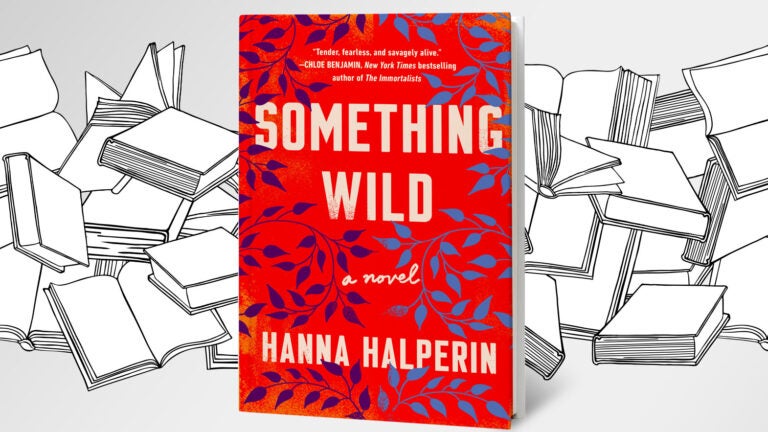Books
Six Grub Street instructors share tips for writing your first novel, and what they’re currently reading.

The hardest part about writing is often knowing where, or how, to begin. And for many who seek a literary community in Boston, the answer can be found at Grub Street.
Established in 1997 by Eve Bridburg, the hub for writers has grown from a meager two instructors and eight students to a robust institution hosting class series and workshops for all skill levels, spanning from introductory fiction, to personal essay composition, to script writing for film, and more. Author Hanna Halperin—who penned our latest Book Club pick, “Something Wild”—teaches at Grub Street, a living testament to the institution’s work fostering writers at all points of their publishing journeys.
To celebrate debut novels like “Something Wild” and help hopeful authors begin (and complete) their own, we tapped six Grub Street instructors to share their advice for aspiring writers and, of course, what they’re currently reading. (We’ll never turn down a good book recommendation.)
Find your community
“Some advice I often share with my novel writing students is the importance of having a community of supportive, like-minded writers who can keep you accountable in producing and revising your manuscript pages. Writers should also strive to ‘check in’ with their book at least once a day, whether that involves actual writing or simply meditating on the narrative, which can help you keep focused and inspired, often allowing new ideas to sprout from your subconscious.”
— Olivia Kate Cerrone
• Teaches: workshops centered on novel writing, historical fiction, and novellas
• Wrote: “The Hunger Saint”
• Currently reading: “Leading Men” by Christopher Castellani
Treat your writing as a job
“If you are a writer aiming for publication, you need to treat your writing as a job. Writing is a creative endeavor, which can obscure the fact that if you are a writer looking for publication, then writing is also a business. That means a couple of things: You need to treat it with the same respect and dedication you would a paid position; you need to carve out time to research, read books in your genre, plot, and write; commit to it and treat it as a job whose salary is delayed. But the second piece is to also understand that writing isn’t necessarily something that comes from some mythical muse. Writing is a craft that can be learned. Dedicate yourself to classes and workshops and focus on learning story structure and how to create a strong character. Use the abundance of craft books or places like Grub Street and give yourself the education in writing the same way you’d educate yourself in any other endeavor before jumping in. Once you have a strong foundation in the elements of storytelling, then you can hand it over to that muse!”
— Lori Goldstein
• Teaches: MG/YA Novel Advanced Workshop; MG/YA Novel in Progress; The Novel Outline; Story Beats; Character Intensive
• Wrote: “Screen Queens,” “Sources Say,” the “Becoming Jinn” series, and “Love, Theodosia” (to be released on Nov. 2)
• Currently reading: “The Husbands” by Chandler Baker
Start a new document for each chapter
“Writing a novel is a lot different from shorter forms, and the length and complexity can be daunting. I advise my students to start a new document for each scene or chapter. That can help preserve forward momentum—and keep writers from overthinking the first pages of their work every time they sit down to work. I also think it’s helpful to find a friend to trade pages with, for accountability. Writing doesn’t need to be lonely.”
— K Chess
• Teaches: Jumpstart Your Novel; Novel in Progress
• Wrote: “Famous Men Who Never Lived”
• Currently reading: “The City We Became” by N.K. Jemisin
Try not to take yourself too seriously
“To paraphrase some of my writing teachers—try not to take yourself too seriously. When writing is hard, when writing is slow (so much of the time), it’s easy to beat yourself up. To wonder why you’re still not done. But as you throw out pages, write, and rewrite again, make some space in your days. Search for the joy and the pleasure. It can be a lonely road. Look for opportunities to indulge in the wonder of the process. This is, at least, what keeps me going.”
— Victor Wei Ke Yang
• Teaches: An advanced fiction workshop on writing about race this fall
• Writing: His first novel based on his short story, “My Son”
• Currently reading: “Dear Senthuran” by Akwaeke Emezi
Love the mess
“Learn to love the glorious mess that is creativity and don’t take yourself so seriously. Stop obsessing about product and start getting enchanted with process.”
— Carolyn Zaikowski
• Teaches: All genres—poetry, fiction, essays, and hybrid-style
• Wrote: “In a Dream, I Dance by Myself, and I Collapse“
• Currently reading: “The American Way of Death” by Jessica Mitford
Don’t give up
“Don’t give up. Publishing is a business. Getting a book contract isn’t just about having the best book, it’s also about having a book the publishing industry thinks will sell. Read, read, read, read, and analyze. Why is a book interesting? What about the books that are boring? What made you stop reading? Why? Make sure you don’t do that in your work. Analyze movies—how do they introduce character? How tightly does the plot hang together?
Get feedback and learn from it. Get feedback early in the process and often. If you can get feedback from a professional in the industry, do it. Evaluate what feedback is relevant and what to discard. This is difficult because sometimes the feedback you want to discard is the feedback you should be paying the most attention to. Not all feedback is good feedback or right for your book. At the same time if you hear the same feedback from multiple sources, pay attention to it.”
— Shalene Gupta
• Teaches: Jumpstart Your Novel; Novel Writing for Teens
• Wrote: “The Power of Trust: How Companies Build It, Lose It, Regain It”
• Currently reading: “Class Act” by Jerry Craft
Stay up-to-date on the Book Club
Catch up on the latest Boston.com Book Club pick and join the virtual author discussions









